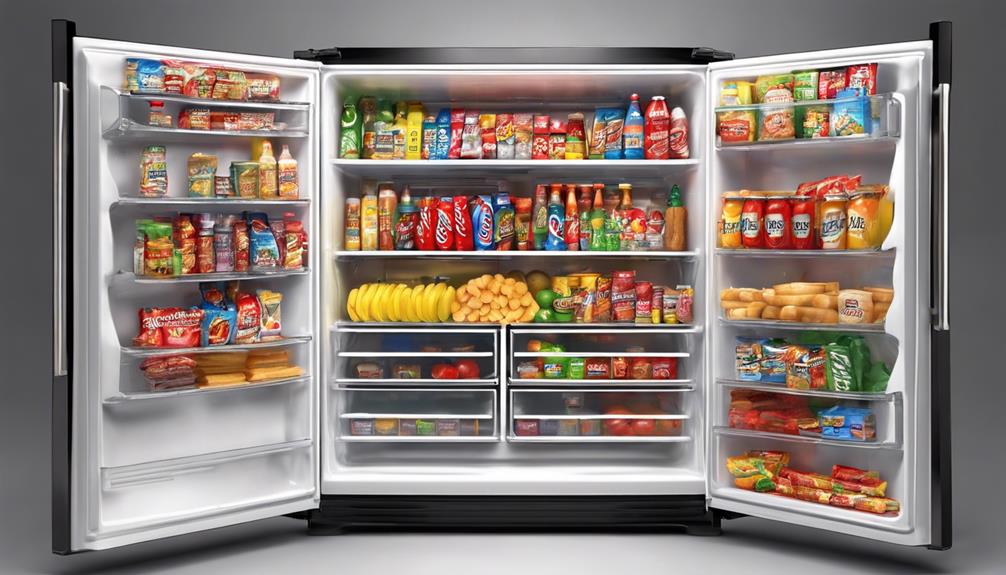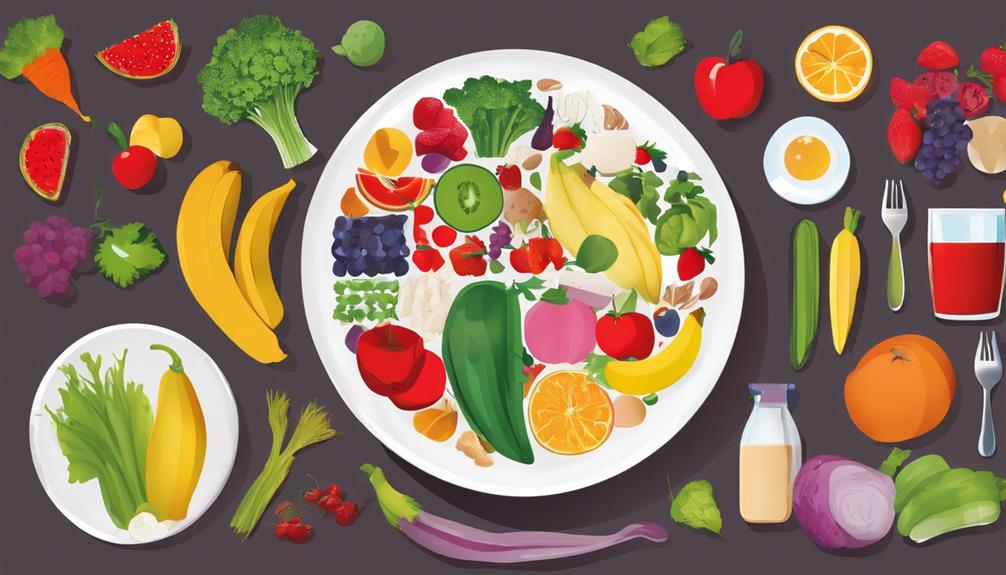In exploring the 'Effective Breastfeeding Weight Loss Diet Guide,' we aim to assist new mothers in maneuvering the journey of shedding postpartum pounds while prioritizing their health and nourishing their little ones.
With a focus on nutrient-rich foods and sustainable habits, this guide offers practical strategies for achieving weight loss goals without compromising on essential nutrients.
But what about those sneaky culprits that could hinder progress? Let's uncover the secrets to success and discover how this guide can pave the way to a healthier, happier postpartum experience.
Key Takeaways
- Prioritize nutrient-rich foods for postpartum recovery and increased calorie needs.
- Plan balanced meals with proteins, carbs, and fats to support sustainable weight loss.
- Include lean proteins, whole grains, healthy fats, and fruits/vegetables in the diet.
- Avoid high-calorie, low-nutrient foods to aid in effective weight loss during breastfeeding.
Importance of Nutrient-Rich Foods
When aiming to optimize postpartum recovery and support healthy weight loss while breastfeeding, prioritizing nutrient-rich foods is key. Breastfeeding individuals have increased calorie needs to support milk production, making it essential to focus on consuming healthy, nutrient-dense foods. These foods not only provide the necessary energy for both you and your baby but also aid in maintaining a healthy weight.
Opting for whole, unprocessed foods guarantees that you're getting a wide array of essential nutrients such as protein, fiber, vitamins, and minerals that are critical for postpartum recovery and overall well-being.
Including a variety of nutrient-rich foods in your diet can help meet the increased calorie and nutrient requirements of breastfeeding. By choosing foods that are high in nutritional value, you can support your body's healing process post-delivery while also promoting healthy weight loss. It's important to remember that the quality of calories consumed is just as important as the quantity when it comes to nourishing both yourself and your little one.
Meal Planning for Weight Loss

To effectively support healthy weight loss while breastfeeding, implementing a well-balanced meal plan that incorporates the right mix of carbohydrates, proteins, and fats is essential. When creating your breastfeeding meal plan to lose weight, it's vital to avoid skipping meals. Skipping meals can lead to overeating or making unhealthy choices due to increased hunger.
Using smaller plates during meal times can help manage portion sizes and prevent overeating. Including snacks like yogurt or nuts in your breastfeeding meal plan can also help curb hunger between meals and support your weight loss goals. Monitoring your calorie intake is key during meal planning for weight loss to ensure gradual and sustainable progress.
Additionally, incorporating healthy fats into your meals, such as avocados or nuts, can provide essential nutrients and support overall well-being while aiding in weight loss. Plan your meals thoughtfully to nourish both yourself and your baby while working towards your weight loss goals.
Foods to Include in Your Diet
Incorporate lean protein sources like chicken, fish, and legumes into your diet to support muscle growth and repair. These proteins are essential for the production of breast milk, providing your body with the necessary nutrients to nourish both you and your baby.
Whole grains such as quinoa, brown rice, and oats should also be included in your meals. They offer sustained energy levels, vital for the demands of breastfeeding, and are rich in fiber, promoting digestive health. Additionally, incorporating lean proteins and whole grains into your diet can aid in weight loss by keeping you feeling full and satisfied.
To further enhance your breastfeeding weight loss journey, add healthy fats from sources like avocados, nuts, and olive oil. These fats support brain function and hormone production, benefiting both you and your baby.
Including a variety of fruits and vegetables will provide essential vitamins, minerals, and antioxidants, promoting overall health and well-being. Opt for low-fat dairy or fortified plant-based alternatives to assure adequate calcium intake, essential for bone health and muscle function during this important phase of your life.
Foods to Avoid for Weight Loss

After discussing the beneficial foods to include in your breastfeeding weight loss diet, it is important to now address the detrimental foods that should be avoided to effectively support your weight loss goals. When trying to lose weight while breastfeeding, it's essential to steer clear of certain foods that can hinder your progress. These include high-calorie, low-nutrient options such as ice cream, chips, crackers, cheese, high-fat meats like bacon, processed meats, candy, and chocolates. These items are not only calorie-dense but also lack the essential nutrients needed to support both your health and your baby's. By avoiding these foods and opting for healthier alternatives, you can better manage your calorie consumption and support your weight loss journey without compromising the quality of your breast milk. To help you make informed choices, here is a table summarizing the foods to avoid for weight loss:
| Foods to Avoid | Reason |
|---|---|
| Ice cream | High in sugar and fat, leading to excess calories |
| Chips and crackers | Processed snacks high in empty calories |
| Cheese | Calorie-dense and high in saturated fats |
Impact on Milk Supply
Reducing calorie intake during breastfeeding may have a direct impact on milk supply due to the decrease in energy available for milk production. To maintain a healthy milk supply while aiming for weight loss, consider the following tips:
- Guarantee Nutrient-Dense Foods: Opt for whole wheat products, which provide sustained energy levels, and include foods like peanut butter, rich in protein and healthy fats, to support milk production.
- Incorporate Black Beans: Black beans are a great source of fiber and plant-based protein, aiding in weight loss without compromising milk supply.
- Balanced Diet Approach: Make sure your meals are well-rounded, incorporating a variety of proteins, fibers, and healthy fats to support both weight loss and milk production.
- Gradual Weight Loss: Aim for a gradual weight loss approach through a structured meal plan to prevent sudden drops in milk supply. Monitoring both calorie intake and milk production can help you find the right balance.
Frequently Asked Questions
What Diet Should I Follow for Weight Loss While Breastfeeding?
We focus on nutrient-dense foods like fruits, veggies, lean proteins, and healthy fats for weight loss while breastfeeding. Avoid crash diets, monitor portions, consult professionals, and stay hydrated. Gradual, sustainable changes support weight loss without affecting milk supply.
How Can I Slim Down Fast While Breastfeeding?
To slim down fast while breastfeeding, we focus on increasing protein for satiety, fiber for digestion, and avoiding processed foods. Incorporating physical activity, like postpartum exercises, helps burn calories. Consulting a healthcare provider is key for success.
How to Lose 20 Pounds in a Month While Breastfeeding?
We recommend against losing 20 pounds in a month while breastfeeding due to potential risks to milk supply and maternal health. Gradual weight loss of 1-2 pounds per week with a balanced diet, exercise, and hydration is safer.
What Is the Best Diet for Breastfeeding Mothers?
We focus on a diet rich in fruits, veggies, whole grains, lean proteins, and healthy fats to nourish both mom and baby. Hydration and adequate protein are key. Consult a dietitian for personalized guidance on nutrient needs and meal planning.
Conclusion
While the idea of a strict diet may seem challenging, the 'Effective Breastfeeding Weight Loss Diet Guide' proves that sustainable weight loss is achievable through balanced nutrition and healthy habits.
By focusing on nutrient-dense foods and following a structured plan, breastfeeding mothers can prioritize their health while shedding those extra pounds.
Remember, it's not about depriving yourself, but nourishing your body for best well-being. So eat well, stay hydrated, and watch the pounds melt away – the irony is, it's easier than you think.








